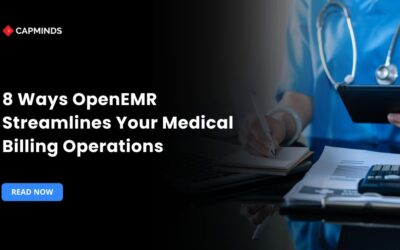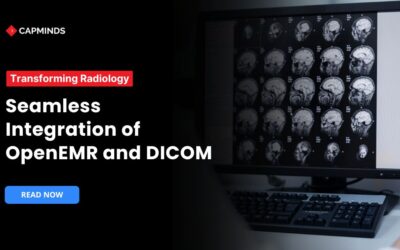OpenEMR for Multispecialty Hospitals [Configuring Modules for Different Departments]
OpenEMR is the most popular open-source EMR system and is still gaining traction. With over 4000 Monthly downloads, multispecialty hospitals are adapting the system. Unlike proprietary EHR, OpenEMR can be customized for diverse hospital departments.
Additionally, OpenEMR’s ONC certification ensures compliance with healthcare standards. In this blog, we’ll explore how OpenEMR can be configured for different hospital departments.
Why OpenEMR is Ideal for Multispecialty Hospitals
OpenEMR is versatile. The biggest advantage of OpenEMR is that it is open-source which makes it a cost-effective solution for multispecialty hospitals.
More than that, OpenEMR is more flexible and highly adaptable. This means it can be customized for specific workflow needs to fit in diverse needs of different hospital departments. This adaptability supports efficient data sharing and coordination across specialties. OpenEMR is also ONC-certified, meaning it complies with U.S. healthcare regulations, safeguarding patient data.
Key Benefits of Using OpenEMR Across Departments
OpenEMR offers various benefits for multi-department multi-specialty hospitals which include:
- OpenEMR is open-source which means no software cost.
- It is highly flexible and customizable so it can be customized for diverse specialty needs.
- OpenEMR integrates with various systems.
- It enables smooth data exchange across departments, such as labs and imaging centers.
- Hospitals can tailor OpenEMR’s features to fit department-specific needs.
- The active community always has your back including developers.
Additionally, OpenEMR includes various integration and customizable workflows, thus making it an affordable option depending on the healthcare practice that would enhance the operations and hence the care given to the patients.
Essential Modules in OpenEMR for Multispecialty Hospitals
OpenEMR has various modules, especially for multispecialty hospitals. Some of the modules are patient management, appointment scheduling, billing & revenue cycle management, and clinical documentation.
1. Patient Management
- OpenEMR has a patient management module that enables to storage of patient information.
- Enables efficient tracking of patient demographics, medical history, and medical records.
- The system organizes and allows to centrally manage all patient health data and information.
- Also, it allows easier access to updated information for multiple departments.
2. Appointment Scheduling
- Scheduling and managing patient appointments is one of the core operations of healthcare.
- OpenEMR has an appointment scheduling module that allows departments to manage appointments flexibly, supporting block scheduling, recurring appointments, and multi-provider scheduling.
- Departments can customize their schedules based on specialty needs.
- This will help to improve patient wait times and optimize clinician availability.
3. Billing and Revenue Cycle Management
- The most complex operations in healthcare are billing and revenue cycle management.
- OpenEMR’s billing module supports medical billing, claim generation, and revenue cycle management.
- It integrates with the majority of clearinghouses which enables multispecialty hospitals to submit claims electronically.
- The billing system includes support for multi-facility billing, making it ideal for large, multispecialty hospitals.
Related: How To Speed Up Insurance Claim Processing with Clearinghouse Integration in OpenEMR?
4. Clinical Documentation
- The clinical documentation module allows providers to document encounters, progress notes, and treatment plans.
- Hospitals can configure templates to meet the needs of different departments.
- It ensures that clinicians capture specialty-specific details while adhering to standard formats for consistency.
Configuring OpenEMR Modules for Different Hospital Departments
1. Customizing OpenEMR for Cardiology
- OpenEMR can be configured to include modules for tracking cardiac-specific data like ECG reports, echocardiograms, and stress tests.
- Customized templates can also support detailed documentation of cardiovascular health metrics.
- This improves the precision and depth of data collected for cardiology patients.
Learn More CapMinds Cardiology Specialty Solution
2. Setting Up OpenEMR for Oncology
- OpenEMR can be tailored to track complex treatment regimens, chemotherapy cycles, and patient response data.
- The system supports staging and grading data entry.
- This enables oncologists to document tumor characteristics and track patients’ treatment progress.
3. Adapting OpenEMR for Orthopedics
- Orthopedic departments can leverage OpenEMR to manage imaging data, track surgical interventions, and monitor physical therapy progress.
- Custom modules for orthopedics can include templates for documenting injury types, recovery timelines, and post-surgical notes.
- This creates a streamlined process for orthopedic-specific data collection and follow-up care.
4. Optimizing OpenEMR for Pediatrics
- OpenEMR can be adapted to monitor child development milestones, vaccination records, and growth charts.
- The pediatrics module can support age-specific alerts and reminders, ensuring timely vaccinations and preventive care.
- This custom configuration helps pediatricians track developmental progress comprehensively and make informed decisions.
In summary, OpenEMR’s flexibility and modular design make it highly suitable for multispecialty hospitals. Each department can use OpenEMR in a way that aligns with their workflow and specialty requirements.
CapMind’s OpenEMR Customization and Integration Service
CapMinds OpenEMR consigns clinicians with the best features and ways to integrate. It makes their workflows more efficient and filtered.
The integrated features will allow them to combine the ability of patient record management with conceptual and concurrent reminders.
This enhances the process of decision-making and improves patient care and quality.
- At CapMinds, OpenEMR custom solutions are developed with much curation and accuracy to match the special practice needs.
- It will be low-cost, and the perfect budget solution for your practice’s long-term future.
- CapMinds OpenEMR prioritizes secure data management & ensures compliance with industry regulations, offering healthcare providers peace of mind.
Get the best technologies and HIPAA-compliant and efficient OpenEMR that can be tailored to fit your practice from CapMinds.
Our OpenEMR services facilitate a Modern User Interface (UI), customization, production support & training. Also facilitates billing, report & specialty enhancements, clearing house integrations, e-prescription, cloud, and more.
“Get the most experienced, proven, and perfect professional support for your OpenEMR”
![OpenEMR for Multispecialty Hospitals [Configuring Modules for Different Departments]](https://www.capminds.com/wp-content/uploads/2024/11/Blog-Featured-Images-2024-11-04T130950.240-1024x536.jpg)



